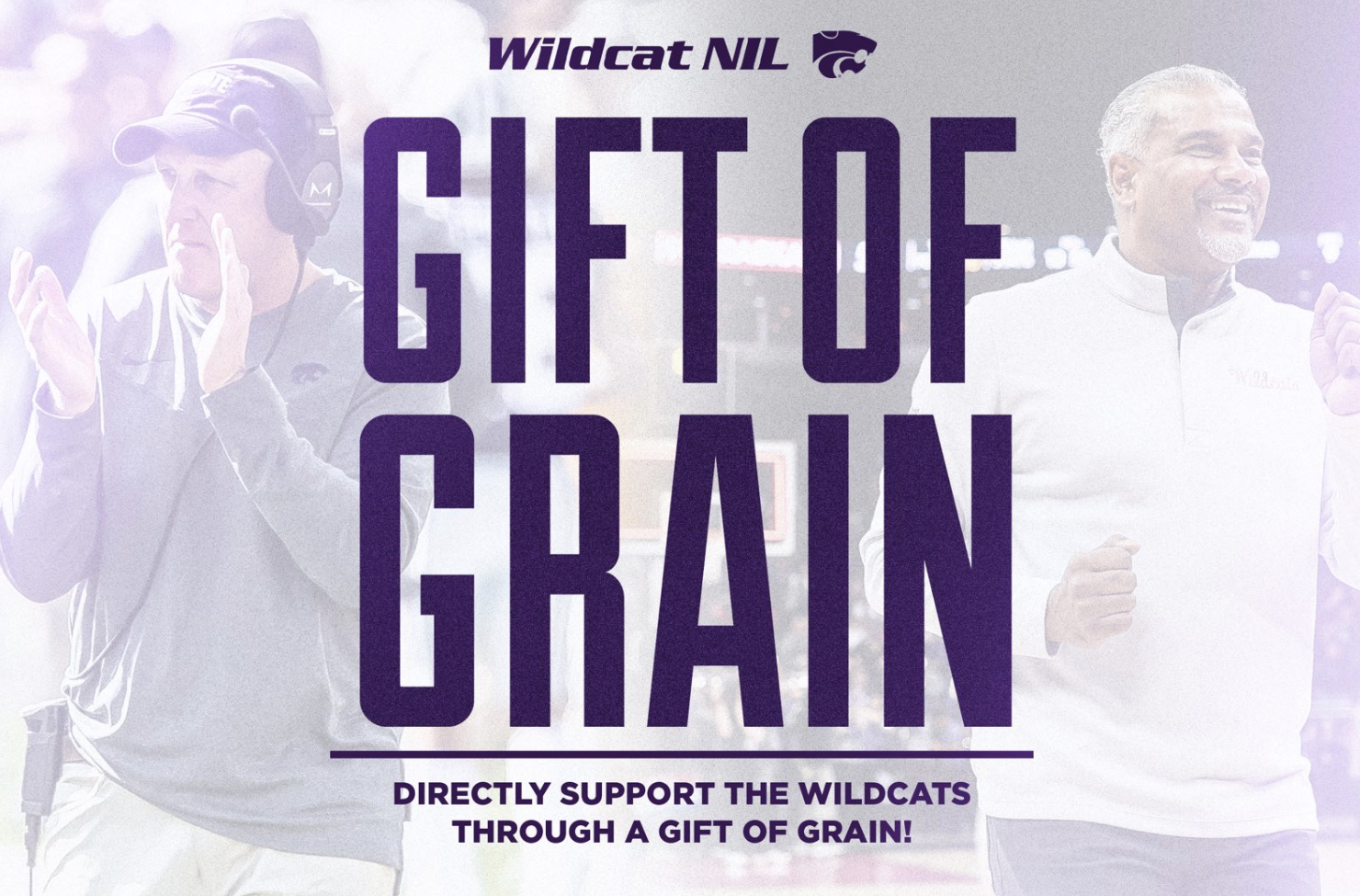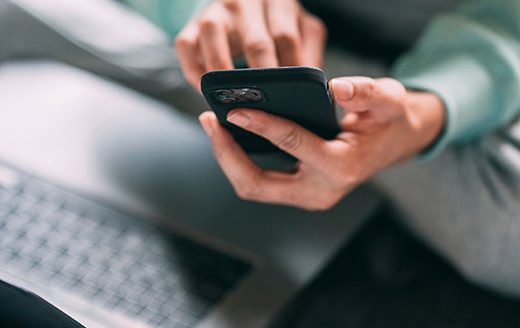An idea unveiled by a farmer’s wife in northeast Kansas has evolved into a unique way for the agriculture community to raise money for athletes at Kansas State University.

Dubbed NIL for short, the NCAA policy gives student-athletes permission to be paid for the use of their “Name, Image and Likeness.”
The Wildcat NIL Gift of Grain initiative got its start during a recent gathering of the nonprofit Wildcat NIL group in the Larry and Michael Oltjen farm shop, near Robinson in northeast Kansas.
“We were trying to create opportunities for student-athletes,” said Curry Sexton, an Abilene native who played wide receiver for the Wildcats’ football team from 2011 to 2014 and is now a Manhattan attorney.
“A woman raised her hand and suggested setting up a gift-of-grain account. That was a fairly novel idea to us,” he said.
It piqued the interest of folks affiliated with Ag Partners Cooperative, based in Seneca, and word spread to J.R. Isch, owner of Morrill Elevator.
Both companies established accounts to accept gifts of grain. Wes Spohr, president and CEO of Ag Partners, said his staff rolled out the necessary paperwork within 48 hours.
The same is true for fundraising at K-State, said Brett Foltz, associate athletic director with the Ahearn Fund, which raises money for the athletic department. One prime example is K-State’s Steer a Year Drive in western Kansas, he said, which has been going on for decades.
“We’ve had the ability for our donors to give commodities for some time, and now the NIL collectives have taken that as another avenue for them to raise money, which is a great opportunity for them and those farmers and producers who want to support our student-athletes,” Foltz said.
What’s different, he said, is NIL is in a relatively new and ever-changing landscape, with a slightly different set of rules, such as fundraising separate from the universities.
The woman at the NIL gathering, who asked not to be named, offered the idea for two reasons, said Jessica Hermesch, director of marketing and communications at Ag Partners.
“She said, ‘It looks like we’re going to have a decent crop this year, and also, it kind of helps us with taxes.’ She said that they’d done gift-of-grain donations to their church and knew it was an option that other farmers seemed to like over making cash donations,” Hermesch said.
There is heavy support for K-State in the northeast Kansas region, she said. Ag Partners’ trade territory also reaches into southeast Nebraska and northwest Missouri.
“We have offered a gift-of-grain service for quite a few years through different charitable organizations, mainly local foundations,” said Hermesch.
Giving grain makes sense for a university heavy into agricultural programs and research that helps to feed the world, Sexton said, and it’s beneficial for producers.
There is a tax incentive to give grain, he said.
“If a farmer were to sell the grain, and say the grain is worth a thousand bucks, the farmer has to report the income, and make a contribution to the 501(c)3, then take a tax deduction. It’s another step that involves more IRS scrutiny,” said Sexton.
“If they essentially give a gift of grain, they can account for losses, while not having to account for profit,” he said. “It’s better in a lot of ways than a straight cash donation.”
Same goes for donations of cattle and beef.
“College athletics is a little out of our purview, but K-State athletics is near and dear to our territory,” said Spohr. “It’s pretty easy for us as a locally owned cooperative, and the producer can get the tax advantage. We’re providing a service for our members.”
As a young man, Sexton was fortunate to have a supportive family and parents who could “pick up the slack” when the scholarship didn’t cover all college expenses.
“It wasn’t the same for a lot of my teammates,” he said. “With NIL, it would’ve helped alleviate some of their stress and put them in much better situations.”
Contrary to early reports, he said NIL is not confined to the quarterback or other star players. Case in point, the K-State Beef program for the offensive linemen who created hats and shirts.
“The top five or six guys will make a few thousand bucks on that from a market they created for themselves,” Sexton said. “NIL has impacted thousands of student athletes and it’s only in year three. There’s an opportunity out there for nearly everybody.”
NIL also carries educational elements for student-athletes that often is ignored in public debates of the benefits.
“College kids are learning about taxes, legal contracts, investment opportunities, and credit, which enhances their collegiate experience,” Sexton said. “There are so many important life components that often go unsaid.”
It wouldn’t surprise Spohr if gifting grain to K-State trends elsewhere.
“We’re an ag state and the K-State tentacles reach a long ways,” he said. “That’s a call for K-State to make, but I don’t know why it couldn’t be replicated, for sure. I hope it’s successful.”
Tim Unruh can be reached at [email protected].
NIL Gift of Grain snares interest at UNL
By Tim Unruh
Being smack dab in the middle of farm country, it would stand to reason that farmers have gifted grain to the University of Nebraska, said Jonathan Bateman, but not yet in the NIL realm.
“The University of Nebraska Foundation has operated in that space, but it is not something I’m aware of in the NIL space,” he said.
Carrying the title of Nebraska’s assistant athletic director of NIL strategy and governance, Bateman would know.
“It’s a great idea,” he said of the program recently launched at Kansas State University.
The news is intriguing as college sports adjusts to an era of compensating athletes.
“It’s definitely something we’ll explore. We’re always looking at new and innovative ideas,” Bateman said. “We’d be shortsighted if we didn’t.”
NIL fundraising is done by third parties, he said.
“We can’t, as an institution, hold NIL funds. We can help promote and fundraise for our collective (collaborative group),” Bateman said. “For us, we work with our collective pretty closely to make sure we’re doing right by our state laws and regulations.”
K-State announced the Wildcat NIL Gift of Grain on Sept. 19. On Sept. 25, the new Wildcat NIL checking account partnership with Western National Bank was added.
“With an account, every time a customer uses their Wildcat NIL debit card, $0.10 goes back to Wildcat NIL to support K-State student-athletes,” a tweet reads. The “partnership goes live” Oct. 1.
Emails to Iowa State University in Ames garnered this response from Shamaree T. Brown Sr., senior associate athletics director: “Iowa State doesn’t have a (gift of grain) program that goes toward NIL. Our university foundation has a (gift of grain) program.
With NIL being relatively new in college sports, it’s still in a developmental stage, and UNL’s Bateman is open to innovations.
“We need to look at all ideas,” he said, “and see what’s best for our student-athletes and our institution.”




